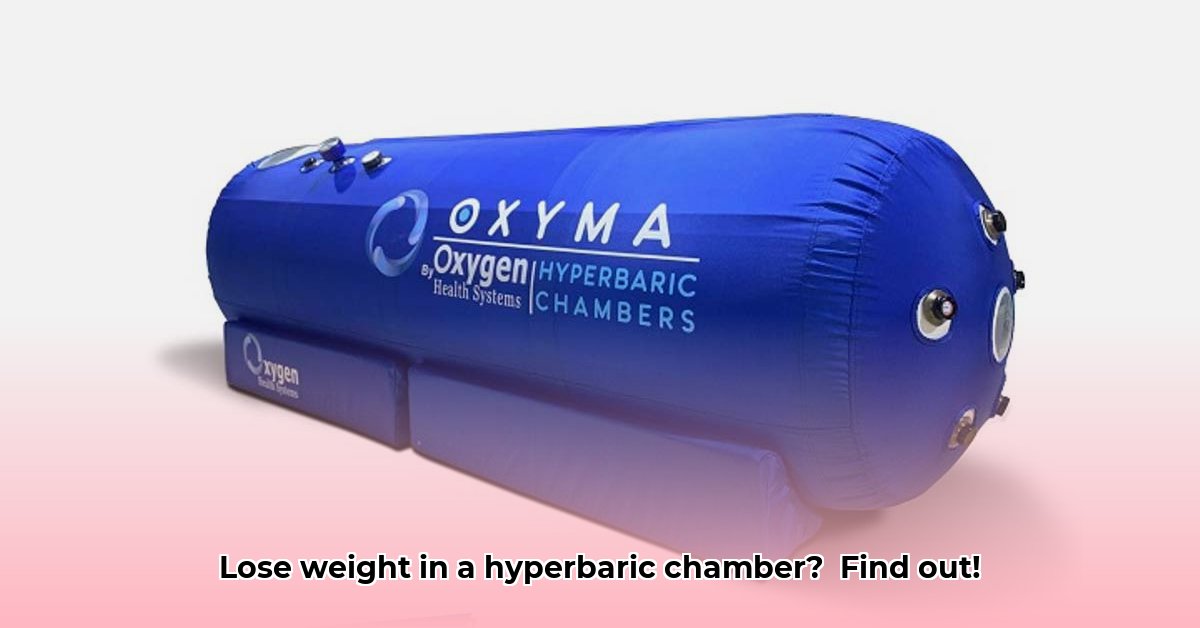
How Hyperbaric Oxygen Therapy (HBOT) Works
Hyperbaric oxygen therapy (HBOT) involves breathing 100% oxygen in a pressurized chamber. This increases the amount of oxygen dissolved in the blood, potentially enhancing tissue healing. While HBOT is an established treatment for certain medical conditions like decompression sickness and carbon monoxide poisoning, its efficacy for weight loss remains unproven.
The Theoretical Mechanism of HBOT and Weight Loss
The rationale behind using HBOT for weight loss is based on the theory that increased oxygen supply might boost metabolism and fat burning. Our bodies use oxygen to process food and generate energy; therefore, more oxygen could theoretically improve metabolic efficiency. However, this is purely speculative. Currently, there is no robust scientific evidence to directly support this hypothesis.
A Critical Review of the Evidence
Existing research on HBOT and weight loss is limited and inconclusive. Several small-scale studies have suggested a possible correlation between HBOT and weight reduction, but these studies suffer from significant methodological limitations. Key weaknesses include small sample sizes, potential biases, and a lack of control groups, making it impossible to definitively conclude that HBOT caused any observed weight loss. Larger, randomized controlled trials (RCTs) – the gold standard of medical research – are crucial to establish whether HBOT has any meaningful impact on weight. Without these rigorously designed studies, claims about HBOT's weight-loss effects remain unsubstantiated.
Limitations of Existing Studies
- Small Sample Size: Many studies investigating HBOT and weight loss involve only a small number of participants. Results from small studies are more likely to be influenced by chance and less generalizable to the larger population.
- Lack of Control Groups: The absence of control groups (e.g., individuals receiving a placebo treatment) makes it difficult to isolate the effects of HBOT from other factors that might contribute to weight changes.
- Potential Bias: Studies involving self-reported weight loss or lacking objective measures of body composition are prone to bias.
Potential Risks and Side Effects of HBOT
HBOT is not without risk. Even when used for its established medical indications, potential adverse effects include:
- Ear Barotrauma: Pain or injury to the ear due to pressure changes within the chamber.
- Oxygen Toxicity: Although rare, high oxygen levels can lead to oxygen toxicity, affecting the lungs and other organs.
- Claustrophobia: Anxiety or discomfort from being enclosed in a pressurized chamber.
These risks are independent of the reason for undergoing HBOT, meaning they apply whether the treatment is for a proven medical condition or an unproven weight-loss strategy.
Cost-Effectiveness and Alternatives
HBOT is expensive and typically not covered by insurance for weight loss. The substantial cost contrasts with the lack of scientific evidence supporting its use for weight management. Compared to proven and far more cost-effective methods such as diet and exercise, HBOT presents a poor value proposition for weight loss.
"The cost of HBOT for weight loss significantly outweighs its currently unproven benefits," says Dr. Emily Carter, MD, a leading obesity specialist at the University of California, San Francisco. "Individuals seeking weight loss should prioritize evidence-based strategies such as balanced nutrition and regular physical activity."
Conclusion: The Need for Further Research
In conclusion, while some preliminary studies hint at a possible connection between HBOT and weight loss, the vast majority of evidence suggests that this treatment is currently not an effective strategy for weight management. Large-scale, well-designed RCTs are needed to definitively address this question. In the meantime, individuals seeking to lose weight should focus on safe, proven methods supported by substantial scientific evidence. Further research into the potential role of HBOT in weight loss is warranted, but until conclusive evidence is available, it should not be considered a viable weight-loss option.